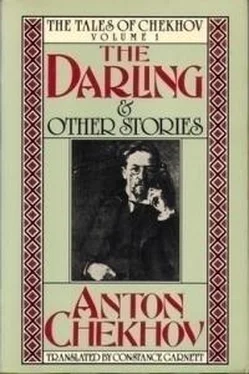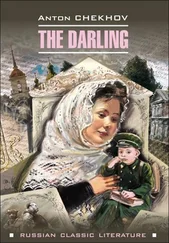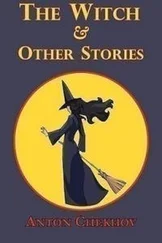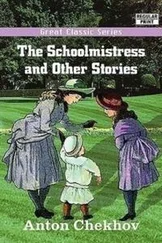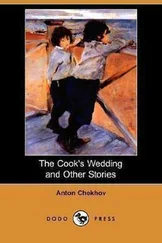Антон Чехов - The Darling
Здесь есть возможность читать онлайн «Антон Чехов - The Darling» — ознакомительный отрывок электронной книги совершенно бесплатно, а после прочтения отрывка купить полную версию. В некоторых случаях можно слушать аудио, скачать через торрент в формате fb2 и присутствует краткое содержание. Год выпуска: 2014, Издательство: epubBooks Classics, Жанр: Классическая проза, на английском языке. Описание произведения, (предисловие) а так же отзывы посетителей доступны на портале библиотеки ЛибКат.
- Название:The Darling
- Автор:
- Издательство:epubBooks Classics
- Жанр:
- Год:2014
- ISBN:нет данных
- Рейтинг книги:5 / 5. Голосов: 1
-
Избранное:Добавить в избранное
- Отзывы:
-
Ваша оценка:
- 100
- 1
- 2
- 3
- 4
- 5
The Darling: краткое содержание, описание и аннотация
Предлагаем к чтению аннотацию, описание, краткое содержание или предисловие (зависит от того, что написал сам автор книги «The Darling»). Если вы не нашли необходимую информацию о книге — напишите в комментариях, мы постараемся отыскать её.
The Darling — читать онлайн ознакомительный отрывок
Ниже представлен текст книги, разбитый по страницам. Система сохранения места последней прочитанной страницы, позволяет с удобством читать онлайн бесплатно книгу «The Darling», без необходимости каждый раз заново искать на чём Вы остановились. Поставьте закладку, и сможете в любой момент перейти на страницу, на которой закончили чтение.
Интервал:
Закладка:
Volodya came dressed correctly for calling, in a swallow–tail coat and white tie. When Sofya Lvovna came in he kissed her hand and expressed his genuine regret that she was ill. Then when they had sat down, he admired her dressing–gown.
"I was upset by seeing Olga yesterday," she said. "At first I felt it dreadful, but now I envy her. She is like a rock that cannot be shattered; there is no moving her. But was there no other solution for her, Volodya? Is burying oneself alive the only solution of the problem of life? Why, it's death, not life!"
At the thought of Olga, Volodya's face softened.
"Here, you are a clever man, Volodya," said Sofya Lvovna. "Show me how to do what Olga has done. Of course, I am not a believer and should not go into a nunnery, but one can do something equivalent. Life isn't easy for me," she added after a brief pause. "Tell me what to do…. Tell me something I can believe in. Tell me something, if it's only one word."
"One word? By all means: tararaboomdeeay."
"Volodya, why do you despise me?" she asked hotly. "You talk to me in a special, fatuous way, if you'll excuse me, not as one talks to one's friends and women one respects. You are so good at your work, you are fond of science; why do you never talk of it to me? Why is it? Am I not good enough?"
Volodya frowned with annoyance and said:
"Why do you want science all of a sudden? Don't you perhaps want constitutional government? Or sturgeon and horse–radish?"
"Very well, I am a worthless, trivial, silly woman with no convictions. I have a mass, a mass of defects. I am neurotic, corrupt, and I ought to be despised for it. But you, Volodya, are ten years older than I am, and my husband is thirty years older. I've grown up before your eyes, and if you would, you could have made anything you liked of me—an angel. But you"—her voice quivered— "treat me horribly. Yagitch has married me in his old age, and you … "
"Come, come," said Volodya, sitting nearer her and kissing both her hands. "Let the Schopenhauers philosophise and prove whatever they like, while we'll kiss these little hands."
"You despise me, and if only you knew how miserable it makes me," she said uncertainly, knowing beforehand that he would not believe her. "And if you only knew how I want to change, to begin another life! I think of it with enthusiasm!" and tears of enthusiasm actually came into her eyes. "To be good, honest, pure, not to be lying; to have an object in life."
"Come, come, come, please don't be affected! I don't like it!" said Volodya, and an ill–humoured expression came into his face. "Upon my word, you might be on the stage. Let us behave like simple people."
To prevent him from getting cross and going away, she began defending herself, and forced herself to smile to please him; and again she began talking of Olga, and of how she longed to solve the problem of her life and to become something real.
"Ta–ra–ra–boomdee–ay," he hummed. "Ta–ra–ra–boom–dee–ay!"
And all at once he put his arm round her waist, while she, without knowing what she was doing, laid her hands on his shoulders and for a minute gazed with ecstasy, almost intoxication, at his clever, ironical face, his brow, his eyes, his handsome beard.
"You have known that I love you for ever so long," she confessed to him, and she blushed painfully, and felt that her lips were twitching with shame. "I love you. Why do you torture me?"
She shut her eyes and kissed him passionately on the lips, and for a long while, a full minute, could not take her lips away, though she knew it was unseemly, that he might be thinking the worse of her, that a servant might come in.
"Oh, how you torture me!" she repeated.
When half an hour later, having got all that he wanted, he was sitting at lunch in the dining–room, she was kneeling before him, gazing greedily into his face, and he told her that she was like a little dog waiting for a bit of ham to be thrown to it. Then he sat her on his knee, and dancing her up and down like a child, hummed:
"Tara–raboom–dee–ay…. Tara–raboom–dee–ay." And when he was getting ready to go she asked him in a passionate whisper:
"When? To–day? Where?" And held out both hands to his mouth as though she wanted to seize his answer in them.
"To–day it will hardly be convenient," he said after a minute's thought. "To–morrow, perhaps."
And they parted. Before dinner Sofya Lvovna went to the nunnery to see Olga, but there she was told that Olga was reading the psalter somewhere over the dead. From the nunnery she went to her father's and found that he, too, was out. Then she took another sledge and drove aimlessly about the streets till evening. And for some reason she kept thinking of the aunt whose eyes were red with crying, and who could find no peace anywhere.
And at night they drove out again with three horses to a restaurant out of town and listened to the gipsies. And driving back past the nunnery again, Sofya Lvovna thought of Olga, and she felt aghast at the thought that for the girls and women of her class there was no solution but to go on driving about and telling lies, or going into a nunnery to mortify the flesh…. And next day she met her lover, and again Sofya Lvovna drove about the town alone in a hired sledge thinking about her aunt.
A week later Volodya threw her over. And after that life went on as before, uninteresting, miserable, and sometimes even agonising. The Colonel and Volodya spent hours playing billiards and picquet, Rita told anecdotes in the same languid, tasteless way, and Sofya Lvovna went about alone in hired sledges and kept begging her husband to take her for a good drive with three horses.
Going almost every day to the nunnery, she wearied Olga, complaining of her unbearable misery, weeping, and feeling as she did so that she brought with her into the cell something impure, pitiful, shabby. And Olga repeated to her mechanically as though a lesson learnt by rote, that all this was of no consequence, that it would all pass and God would forgive her.
The Trousseau
I HAVE seen a great many houses in my time, little and big, new and old, built of stone and of wood, but of one house I have kept a very vivid memory. It was, properly speaking, rather a cottage than a house—a tiny cottage of one story, with three windows, looking extraordinarily like a little old hunchback woman with a cap on. Its white stucco walls, its tiled roof, and dilapidated chimney, were all drowned in a perfect sea of green. The cottage was lost to sight among the mulberry–trees, acacias, and poplars planted by the grandfathers and great–grandfathers of its present occupants. And yet it is a town house. Its wide courtyard stands in a row with other similar green courtyards, and forms part of a street. Nothing ever drives down that street, and very few persons are ever seen walking through it.
The shutters of the little house are always closed; its occupants do not care for sunlight—the light is no use to them. The windows are never opened, for they are not fond of fresh air. People who spend their lives in the midst of acacias, mulberries, and nettles have no passion for nature. It is only to the summer visitor that God has vouchsafed an eye for the beauties of nature. The rest of mankind remain steeped in profound ignorance of the existence of such beauties. People never prize what they have always had in abundance. "What we have, we do not treasure," and what's more we do not even love it.
The little house stands in an earthly paradise of green trees with happy birds nesting in them. But inside … alas … ! In summer, it is close and stifling within; in winter, hot as a Turkish bath, not one breath of air, and the dreariness! …
The first time I visited the little house was many years ago on business. I brought a message from the Colonel who was the owner of the house to his wife and daughter. That first visit I remember very distinctly. It would be impossible, indeed, to forget it.
Читать дальшеИнтервал:
Закладка:
Похожие книги на «The Darling»
Представляем Вашему вниманию похожие книги на «The Darling» списком для выбора. Мы отобрали схожую по названию и смыслу литературу в надежде предоставить читателям больше вариантов отыскать новые, интересные, ещё непрочитанные произведения.
Обсуждение, отзывы о книге «The Darling» и просто собственные мнения читателей. Оставьте ваши комментарии, напишите, что Вы думаете о произведении, его смысле или главных героях. Укажите что конкретно понравилось, а что нет, и почему Вы так считаете.
